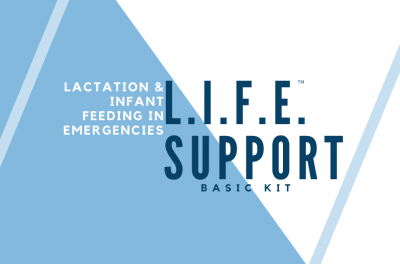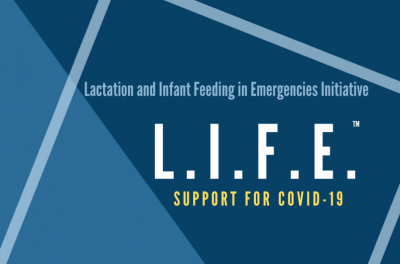Humanitarian Maternal and Child Health
At CGBI, our vision is to strengthen equitable access to skilled support during pregnancy, birthing, lactation, infant and young child feeding, and family planning in humanitarian crises and emergency situations. We aim to do this through education, technical assistance, research and innovation, and policy advocacy.
Our work is informed by a human rights and reproductive justice framework. We engage in collaborative projects and participatory action research to advance the implementation of community-driven solutions in emergencies, both in the U.S. and in other countries.
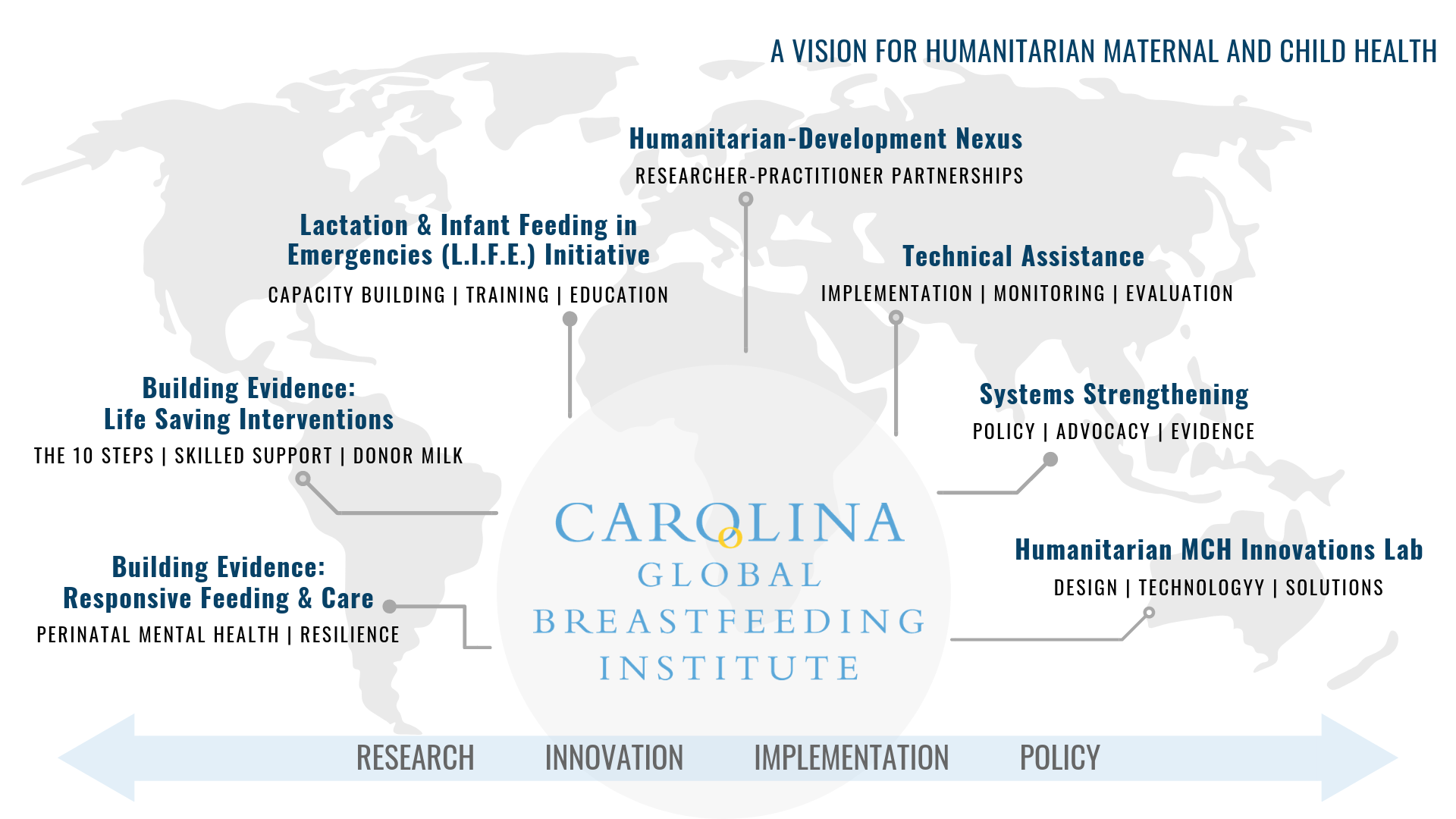
Learn more about our projects and initiatives by clicking through the tabs below.
We have compiled resources that may assist health workers, frontline responders, shelter managers, community-based organizations, and volunteers in disasters and emergencies to support safer infant and young child feeding in emergencies.
“Parenting with Love” Project: Working to Improve Maternal and Child Feeding and Caring Practices in Nicaragua
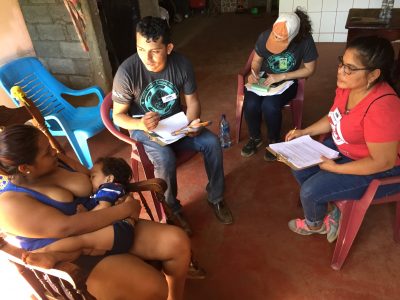
A woman breastfeeds while talking with researchers.
The overall goal of this community-based participatory research project is to improve infant nutrition and development and maternal-infant resilience.
Recently, over 400,000 people in Nicaragua have lost their jobs due to a weakened economy. Approximately 30% of the population live on $1.79 or less per day and the population is experiencing a lack of social cohesion and lower numbers of people covered by health insurance. Mothers and children are experiencing high morbidity and mortality rates resulting from mostly preventable causes, and depression and anxiety are on the rise.
Responsive parenting has been shown to improve outcomes in at-risk children, and this project aims to research and reinforce responsive parenting strategies in the local context. In Phase 1 of the project, AMOS Health and Hope will use CBPR to look at current breastfeeding, complementary feeding, child-caring practices, and resilience factors. Community members will be involved in the design, implementation, and analysis of formative research, providing their input on ways they think it would be best to address issues of responsive parenting in their communities. In Phase 2, the formative research and the community’s input will be used to create a pilot program and contextually-based educational materials in Nejapa (a peri-urban community outside of Managua) and 4 rural communities of the RACCS to reach mothers with messages and practices focused on attachment parenting. The education modules will then be evaluated via participant feedback.
This work has the potential to reach 22 rural communities and 2 districts of Managua, and will draw lessons learned from the previously developed responsive feeding messages CGBI and Food for the Hungry (FH) created for a local CBPR project in rural Guatemala. Read about that project here.
This work is being carried out through a partnership between AMOS Health and Hope, the University of Washington, Food for the Hungry, and CGBI.
Understanding the Delivery Gap for Internally Displaced Mothers and Children in Fragile Contexts: Perinatal Mental Health, Infant Feeding Practices, and Malnutrition in Iraq
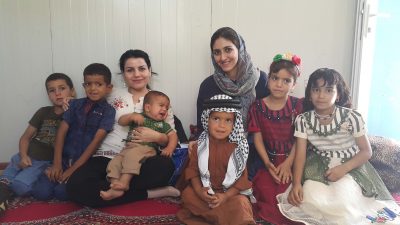
Iraqi mothers and childen pose for a photo.
The overall goal of this interdisciplinary mixed-methods project is to gather evidence needed to close the gap in delivery of integrative perinatal, maternal, newborn, and child services to internally displaced Yazidi families in the Kurdistan region of Iraq.
Gender-based health disparities resulting from poverty and structural violence are reproduced in complex emergencies. They are often exacerbated by humanitarian aid that fails to prioritize the complex and mutually interdependent nutritional and psychosocial needs of mothers, newborns, and young children. Providing mothers with responsive, integrative, and healing centered support across the reproductive continuum remains a key challenge and gap in humanitarian medicine. There is a dearth of evidence evaluating the impact of integrated psychosocial and breastfeeding support on maternal mental health or infant nutrition outcomes in fragile contexts. The proposed project aims to contribute to fill this evidence gap.
In this project we employ design thinking to advance the innovative implementation of community-driven solutions, which are responsive to the complex challenges in the local context. Developing ways to disrupt the cycle of gender-based structural violence in the wake of crises in fragile contexts begins with protecting, supporting, and nurturing holistic perinatal maternal, newborn, and young child health and well-being. Study findings will provide a highly contextualized assessment of gaps in care, and a roadmap for recommended action to address such gaps.
This project is a collaboration between Dr. Aunchalee Palmquist (CGBI), Dr. Dilshad Jaff (Global Solutions), Dr. Pegah Seidi, Nazdar Qudrat at University of Garmian, and the team at Advance Access & Delivery (Tom Nicholson, Michael Wilson, Amanda Brumwell).
Mental Health Status and Unmet Needs for Mental Health Services of the Iraqi Adult Internally Displaced peoples (IDPs) in the Garmian Region, Iraq: A Cross-Sectional Survey
The goal of this study is to gather data on the current rates of psychological distress and PTSD among Iraqi IDPs so that appropriate services are in place to address these needs. Project aims are (i) to evaluate the mental health service needs as identified by the population; (ii) assess mental health care services that are available, and to (ii) identify the risk factors for developing psychological distress. This information will be used to ensure that current and future mental health services are well-informed. Furthermore, the findings of this study may provide guidance for other countries hosting IDPs wanting to implement mental health care services.
Principal Investigators: Dr. Pegah Seidi, Nazdar Qudrat at University of Garmian
Supported by: Advance Access & Delivery team (Tom Nicholson, Michael Wilson, Amanda Brumwell), Dr. Aunchalee Palmquist (CGBI), Dr. Dilshad Jaff (Global Solutions).
Infant Feeding Support in Complex Humanitarian Crises: Volunteerism During ‘The Syrian Refugee Crisis’ in Europe
The armed conflict that erupted in Syria in 2011 gave rise to what the UNHCR has called the biggest refugee displacement and emergency crisis of our time. Nearly 13 million Syrians, or 6 out of 10, have been displaced after 7 years of conflict. This displacement accounts for nearly half of all displaced Syrians in the world.
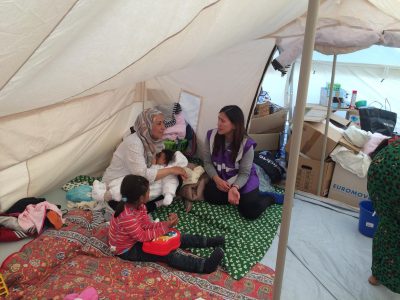 Over 60% of the displaced population of Syrians that arrived in Greece during 2016-2017 time were pregnant women, mothers with newborns, infants, young children, and other unaccompanied minors. Their arrival in Europe led to an unprecedented mobilization of local and international volunteers interested in supporting infant and young child feeding in emergencies (IYCF-E) responses.
Over 60% of the displaced population of Syrians that arrived in Greece during 2016-2017 time were pregnant women, mothers with newborns, infants, young children, and other unaccompanied minors. Their arrival in Europe led to an unprecedented mobilization of local and international volunteers interested in supporting infant and young child feeding in emergencies (IYCF-E) responses.
The goal of this study was to document the volunteer uprising for IYCF-E in Europe using narrative inquiry and rapid ethnographic assessment methods. Semi-structured interviews were conducted in-person and via telephone with 32 individuals who volunteered, in varying capacities, to support response efforts specifically related to pregnancy, birthing, breastfeeding, and other infant and young child feeding practices. Rapid ethnographic assessments of camps for displaced persons in France, Greece, and Germany were conducted to document the provision of IYCF-E support and living conditions of displaced families. This study is the first to use systematic qualitative research methodologies to assess the experiences of volunteers who were engaged in IYCF-E support in Europe during the Syrian conflict. Insights from this study will contribute to a critical understanding the potential contributions, challenges, and ethical considerations of volunteerism for IYCF-E for this emergency. Findings will also lead to recommendations on improving support for IYCF-E efforts, particularly in middle- and upper-income countries.
Co-Principal Investigators: Dr. Aunchalee Palmquist (CGBI) and Dr. Karleen Gribble (Western Sydney University)
The first publication from this research can be found here (full PDF available upon request to: apalmquist@unc.edu).

